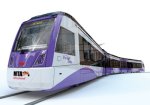F-Line to Dudley
Senior Member
- Joined
- Nov 2, 2010
- Messages
- 9,553
- Reaction score
- 10,431
Right. And don't forget that the trend in rolling stock orders these days is to bank ~generous~ Service & Support contracts into the contract base so the fleets have lifetime vendor service. Especially valuable when fleets have one-vendor or one-make hegemony, which the T certainly will being an all-CAF shop in the LRT division. S&S recoups its value on the back end when these things are still readily repairable near end-of-life (a situation quite unlike the Bredas and their huge dead line of out-of-service cars that'll cost an arm-and-a-leg to get someone to fab parts for).Worth noting at least 2 things.
1) Unless you're talking about a different more recent order, that order was back in 2016, even as they only entered service last year. Prices have considerably increased in the intervening 6 years.
2) While the fleet size was to increased to 184 cars from 62, I believe the actual order was for 122 cars. They ordered another 30 odd options in 2017.
Adjusting for cumulative inflation of ~23% since 2016, Sound Transit's order has a 2022 value of $897m. Using their pricing, 102 units would cost the MBTA ~$750m - and given the larger trainset and customizations required, I'd say that we're in the ballpark there. Of course, I haven't looked for any other more recent large US LRT orders to validate that.
These aren't unicorns, despite them having a naming convention in Boston "Type" designations. Under the hood these are going to be Urbos 3's by another name and quite a bit less customized from the vehicle family base than even the Type 9's (which are themselves heavily Urbos-derived) were.



